- Home
- Howard Jacobson
Kalooki Nights Page 2
Kalooki Nights Read online
Page 2
The Manchester Guardian wouldn’t take it but the Crumpsall Jewish Herald did, publishing it alongside a leader article warning of another Jewish Holocaust.
Jew, Jew, Jew.
Like many atheists and communists, my father never quite got the joking thing. He couldn’t understand why, if I was joking, I didn’t look more cheerful. And if I couldn’t look more cheerful, what I found to joke about.
It’s a mistake commonly made with cartoonists. People confuse the matter with the man. Since you draw the preposterous it is assumed that you are the preposterous. Everyone thinks you must be joking all the time, and in the end, if you are not careful, you come to believe you must be joking all the time yourself.
Jew, Jew, Jew. Joke, joke, joke. Why, why, why?
You can have too many of all three, as Chloë, my first flaxen Übermadchen Gentile wife, told me in explanation of her wanting a divorce.
‘Why’s that?’ I asked her.
‘There you go again,’ she said.
She thought I was trying to get under her skin deliberately. In fact it was just bad luck. With Chloë every word I said came out differently from how I meant it. She rattled me. Made me speak at the wrong time, and in the wrong tone of voice. I felt that she was interrogating me and in fear of her interrogation I blurted out whatever I thought she wanted me to say, which was always the opposite to what she wanted me to say, that’s if she wanted me to say anything.
‘Do I frighten you?’ she asked me once.
‘Of course you frighten me,’ I told her. ‘That very question frightens me.’
‘And why is that, do you think?’ But before I could answer she held her hand up in front of my mouth. ‘Don’t,’ she said. ‘I know what’s coming. Because you’re Jewish. And you can’t ask a Jew a question without him thinking you’re Gestapo.’
Since I wasn’t permitted to speak, I turned my face into a question mark. So wasn’t she Gestapo?
Hence her wanting a divorce.
We’d just been to a St Cecilia’s Day performance of Bach’s St Matthew Passion in St Paul’s Cathedral – Chloë, to spite me, cramming in as many saints as she could muster. If she could have sat me next to someone with St Vitus’s Dance – say St Theresa – she would have.
‘I’d call that the last straw,’ she said as we were coming out.
‘What are you telling me, Chloë, that our marriage is dashed on the rocks of Christ’s immolation?’
‘There you have it,’ she said, still holding my arm, which I thought was odd given the finality of the conversation. But then again, the steps were icy. ‘You call it an immolation, everyone else calls it the Passion.’
‘That’s just me trying to keep it anthropological,’ I said.
‘Trying to keep it at arm’s length, you mean. What are you afraid of, Max? Salvation?’
I turned to face her. ‘I don’t think what we’ve seen offers much salvation for the Jews, Chloë.’
‘Oh, Jews, Jews, Jews!’
‘Well, they do figure in the story.’
‘They figure in your story!’
‘I’m afraid my story is this story, Chloë. Would that it were otherwise.’
‘You see! We can’t even go to a concert without your bleeding heart coming with us.’
‘Then you should be more careful which concert you choose for us to go to.’
‘Max, there isn’t one that’s safe. They all come back to the Nazis in the end.’
‘Have I said anything about the Nazis?’
‘You don’t need to say anything. I know you. You’ve thought of nothing else all evening.’
Not quite true – I loved and had thought about the music – but near enough. I had wept – as I always weep – at the desolation of Christ’s cry to a God who wasn’t answering. Eli, Eli, lama sabachthani? My God, my God, why hast thou forsaken me?But I’d also joked sotto voce (that’s to say, so that only Chloë could hear) – as I always joke sotto voce at this moment in this greatest of all liturgical works – that it was something else having the question put in German. Mein Gott, mein Gott, warum hast du mich verlassen?! A bit rich, a plummy German baritone ‘why’,when the God who last forsook the Jews did so, as one might put it – no, as one is duty bound to put it – under German auspices.
Warum? You are not, mein kleines Brüderlein, the ones to ask that question. Just you go about the business of building Holocaust memorials and making reparation to your victims and leave the whys to us.
Jew, Jew, Jew. Joke, joke, joke. Warum, warum, warum?
For which Chloë, weary with all three, was leaving me.
But it behoves a man with a story of perplexities to tell to put his whys on the table early.
Such as:
Why did God, having once chosen us, forsake us?
Why did my friend Emanuel Washinsky – from whose lips I first heard God accused of dereliction (in our house we accused God of nothing except not existing) – forsake his family and beliefs and commit the most unspeakable of crimes against them?
Why, if I call Emanuel Washinsky my friend, did I keep my friendship with him separate from all my other friendships – a thing religiously apart – and why did I wash my hands of him when it was reasonable to surmise that he needed friendship most?
Why did I marry Chloë?
Why, after being divorced so comprehensively by Chloë – divorced from my own reason, I sometimes felt – did I marry Zoë? And why, after being left by Zoë, did I marry . . . but I must not give the wrong impression. This is more a tale of separation than of marriage.
Why – speaking of disloyalties, forsakings and acts that seemingly cannot be explained – did I forsake myself to draw cartoons, when I am averse by nature to caricature, ribaldry and violence?
Why do I wake each day as though I am in mourning?
Who or what am I in mourning for?
3
Why Elohim forsook us, or why Manny Washinsky raised his hand against those he was meant to honour, or why I married who I married, are questions which cannot be answered in a short space of time. But I can explain – which is at least a start – why I took up crayons. Because I liked the oily smell of them. Because I liked it that they streamed colours. Because I enjoyed watching a picture emerge that I hadn’t intended to make. Because I discovered I could do a likeness. Because I felt there was some emotion locked away inside me that I couldn’t get at until I drew it on a piece of paper. And because I wanted people to admire and adore me. Show that you can draw when you’re four or five years old and everyone is awestruck. It’s the same with words, only words don’t win you the affection pictures do. They lack the charm. There is something, it would seem, uncanny about sentences issuing fully formed from a cherub’s mouth, as though Beelzebub must be in there somewhere, hammering phrases out on his infernal anvil. Whereas a wavy purple path leading to a little orange house with plumes of smoke spiralling from its tipsy chimney – that’s the work of God, our protector, ever with us, Elohim who modelled man out of clay and put him in a garden.
But those who were enchanted by my precocious pictorial genius should have looked harder at the blackness of that plume of smoke and wondered what was burning.
I drew so the world might love me, and subsequently drew ironically, against myself, because I couldn’t love the world.
The plainer explanation for why I drew at all – an explanation favoured by my mother, who blamed herself, and who thought I might have had a happier, less fractious life had I gone into commerce or the law (and I agree with her) – is that I was born into a noisy house and couldn’t get a word in edgeways. Both my parents had loud voices, earnests of good lungs and therefore, you would have thought, long lives; my mother’s a lovely honeyed contralto, wasted, I used to think, marvelling how beautiful my older sister Shani looked in whatever she was wearing, prior to marvelling how much more beautiful she would look if she were wearing something different; and wasted even more on shouting out ‘Kalooki!’ with her friend
s every other weekday evening. Kalooki, for those who don’t know it, is a version of rummy much favoured by Jews – Jews, Jews, Jews – on account (though not all Jews would agree) of its innate argumentativeness. My mother’s trumpeting ‘Kalooki!’ at the moment of laying out her cards, for example, was not incontestably the right thing to do. But that, as I gathered, was the joy of it: not just the game but the bickering over how and in what spirit it should be played. Some kalooki evenings were great social successes though not a hand was dealt. ‘A fast game ’s a good game,’ someone would say, and agreeing how fast was fast would take up the rest of the night. My father stayed out of this, employing his bass-baritone in a higher cause (though not always in another room), preaching the religion of non-religion, a species of Judaism emptied of everything except its disputatiousness and liberality – a sort of secular universalism I suppose you’d have to call it, comprising socialism, syndicalism, Bundism, trade unionism, international brotherhoodism, atheism, not to mention pugilism – which he imagined would one day be the saving of the Jews. And didn’t just imagine it either, but discussed it vociferously and voluminously with the communists and syndicalists and atheists and pugilists who took advantage of his open-door policy, turning up whenever they felt like it, as much to watch my mother leap from her seat and shout ‘Kalooki!’, I always fancied, as to change the world and the Jew’s place in it. Add to their chorus the racket my sister made, slamming doors, crying over her hair and throwing shoes around her bedroom – never the right ones, no matter how many pairs they bought for her, never the right ones to go with the clothes she wanted to wear, which were never the right ones either – and you will have some understanding of the clanking foundry in which my reticence was forged.
But there was more noise still in my young life in the form of an uncle, and in the continuous voicing of my father’s objections to that uncle – that’s if he really was an uncle – Tsedraiter Ike. The same uncle who was always saying that for this the Nazis wanted to exterminate us, though it was my father’s contention that it was actually for him, Tsedraiter Ike, that the Nazis wanted to exterminate us.
We had five Uncle Ikes in our family, taking family to include every Jew who shared our name, married into our name, or offered to be friendly, ours being a sort of Battersea Dogs’ Home for stray Jews. Big Ike, Little Ike, Liverpool Ike, Dodgy Ike and Tsedraiter Ike – called Tsedraiter Ike because he was the tsedraitest, that’s to say the most imbecile, of the five. Also called Tsedraiter mischievously, I fancied, because he could not himself,with a single tooth, negotiate the word. Tsedraiter: the Tse to be pronounced sibilantly, with a sort of lisping hiss: Tsss, Tsss; the vowel sound somewhere between a sir and a sid:Tsssirdraiter/Tsssidraiter; the second and third syllables to rhyme with hater.
Why Tsedraiter Ike lived with us, I never knew. Precisely what relation to us he bore, I never knew either and suspect I wasn’t meant to know. As with other family embarrassments, you just accepted and asked no questions. I think I assumed he was my mother’s brother because it was she who always defended him from my father’s scorn. In appearance, though, they could not have been more unalike. My mother – born Leonora Axelroth – as euphonious as her name, tall and tapering, legs and ankles if anything too thin, like an Ethiopian’s, her hair almost bronze in colour, her skin, the minute it was exposed to sun, the same. A burnish on her, which made her look expensive, of the highest quality. Whereas Tsedraiter Ike (who received letters addressed to Isaac Finster, not Axelroth) was flabby, one-toothed, wet about the mouth, discoloured, as though he ’d been dipped in ink at birth. I don’t think I ever knew what he did for a living, but it couldn’t have been much because he was almost never out of the house, at least in my early years, and, from what I gathered from the arguments about him, made no contribution whatsoever to his keep. ‘Keep?’ I recall my mother saying in his defence. ‘He isn’t an animal, he doesn’t have to be kept. But if we’re talking keeping, at least he keeps himself smart’ – ‘smart’ being a big accolade with my mother, a word she used almost as often as ‘Kalooki!’ To which my father – who was never smart – replied always with the same words: ‘Correction: at least I keep him smart.’
In fact Tsedraiter Ike wasn’t smart either, merely fallen-formal in the manner of some minor shtetl functionary, one of those embittered, jeering, half-demented clerks you read about in nineteenthcentury Russian novels, halfway to being rabbinical, in Tsedraiter Ike’s case, in a black, far too shiny gaberdine suit and a sort of morning, or do I mean mourning, tie. It’s my sense that wealthy Russian and Polish families once retained such people talismanically, partly as jesters, partly to assuage their consciences, as though they could thereby pay their dues to learning or religion or the twisted life of the mind. My father tolerated Tsedraiter Ike, though he could ill-afford him, in a spirit that was the very obverse of this. ‘Look what we have left behind us,’ that’s what he was saying. ‘Behold our ignominious past. Learn from this human wreckage what we dare never allow ourselves to sink into again.’ In response to which unspoken motive, Tsedraiter Ike hummed loudly around the house, making sounds that were more a parody of Hebrew prayer, as far as I could tell, than prayer itself, rocking, rustling, moaning, wailing, whistling, choking, humming – humming Hebraically, yes, it’s possible – and, whenever he caught my eye, winking at me and interrupting his devotions or whatever they were to chuck me affectionately under the chin and call me, in reference to heaven knows what, his ‘old palomino’. Palomino being, by my calculation, one of the hardest words a person with only one tooth in his head could ever try to pronounce. Which could be why he never left off trying to pronounce it.
There was a song he sang, too, my Uncle Ike, whenever he felt himself to be under pressure from my father, made to feel unwelcome, or otherwise humiliated. ‘It’s only me from over the sea, said Barnacle Bill the sailor.’ An apology for his existence which was clearly an expression of the sense of worthlessness my father instilled in him, though why the nautical reference I had no idea. But it all added to the domestic cacophony, whatever it meant.
So yes, had there been anything I badly needed to get off my chest in those early years I might well have taken the option of sketching it on paper.
Whatever the reasons, I was a mournful, withdrawn, apparently biblical-looking baby – Mendel, Tsedraiter Ike called me when my father wasn’t listening, Mendel which he tried to persuade me was biblical Hebrew for Max, and which he went on using secretly in preference to ‘my old palomino’ when the Jewishry in which he sought to enmesh me darkened – and I remained biblical and withdrawn throughout the chrysalidal stage after that, until one afternoon, sitting on my mother’s lap in a train bringing us back from an afternoon on a cold New Brighton beach with Liverpool Ike ’s family, my nasal cousins Lou and Joshua twice removed, I said Jew Jew, Jew Jew, Jew Jew . . .
‘Sounds to me that he was imitating the train,’ my father guessed when my mother excitedly told everybody about it later. ‘Am I right, Maxie? Was that the sound the engine made? Choo choo, choo choo?’
‘Jew Jew,’ I said, clamping my teeth around the Js. ‘Jew Jew, Jew Jew . . .’
‘What about the whistle, then? ‘Whoo whoo! Whoo whoo!’
I shook my head. ‘Jew Jew,’ I said. ‘Jew Jew, Jew Jew.’
He gave me a cold stare. As though I’d informed him I wanted to be a rabbi when I grew up. Or that it was my ambition to return to the Russia we never talked about. Novoropissik, as he called it, a Nowhere place of piss and sick. Near where the Danube spilled its shit into the Black Sea. Spiritual if not actual home of Tsedraiter Ike.
‘Your doing,’ he told my mother.
‘My doing?’
‘Kalooki this, kalooki that. Kalooki’s the only word the kid ever hears.’
‘What’s kalooki got to do with anything?’
‘How do you expect him to grow up in a world free of all that shtetl rubbish if you won’t stop reminding him of it? Kalooki, kalooki, night and day kalo
oki! We live in Crumpsall in the twentieth century, not Kalooki in the Middle Ages.’
‘Jack, kalooki isn’t the name of a shtetl.’
‘Isn’t it? Well, that’s what you say.’ Whereupon he stormed out of the house.
Years later I looked up Kalooki in an atlas, to see whether there was such a place within spitting or sicking distance of Novoropissik. I couldn’t find one. But there was a Kalocsa in Hungary, and a Kaluga one hundred miles to the south-west of Moscow on the left bank of the Oka, and a Kalush in the Ukraine where Jews had lived and been submitted to the usual indignities, so maybe he was confusing kalooki collectively with those – the marshlands of our hellish past.
It’s possible I imagined it, but after the Jew Jew, Jew Jew incident I thought my father shrank from me a little, as a man will shrink in fear and loathing from the ghost of someone he thought he’d murdered and disposed of long ago. And it’s not impossible that his socialist friends shrank from me as well, the little cancer in the body of their hope for change.
They needn’t have worried. I have not become a rabbi. Nor have I been back to Novoropissik. Or gone the way of Tsedraiter Ike. Unless hearing Jew Jew, Jew Jew, Jew Jew, whenever a train goes through a tunnel, amounts to the same as any or all of those.
To that hypersensitivity, at least, I plead guilty. I am one for whom a train can never again be just a train. First I have to enquire whom the train, please, is carrying. Then who commissioned it. Then where its ultimate destination is.
Jew Jew, Jew Jew . . .
The Auschwitz Express.
I could not of course have known anything about Auschwitz at the time I sat like a precocious Hebrew prophet on my mother’s lap and blew the horror whistle. But footfalls echo in the memory, and who’s to say what footfalls, past or future, a child’s memory contains?
For what it’s worth, I believe we would be able to hear Adam’s tread if we knew which part of our memories to access. And Abraham coming out of his tent to receive the Covenant. And Moses the lawgiver, in all his years, climbing to the top of Pisgah. And the Jews of Belsen and Buchenwald crying out to be remembered.

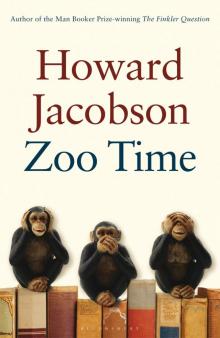 Zoo Time
Zoo Time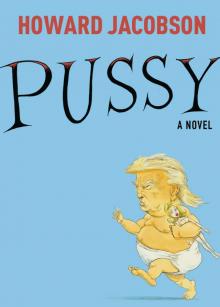 Pussy
Pussy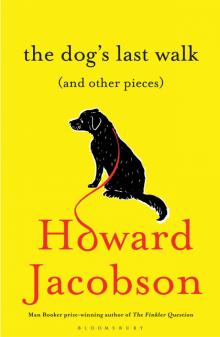 The Dog's Last Walk
The Dog's Last Walk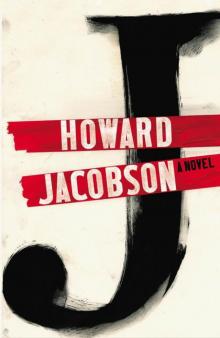 J
J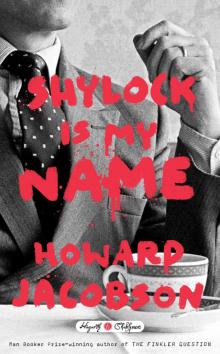 Shylock Is My Name
Shylock Is My Name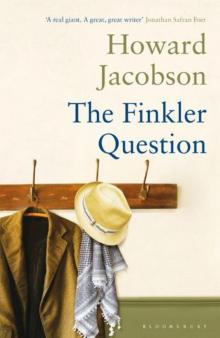 The Finkler Question
The Finkler Question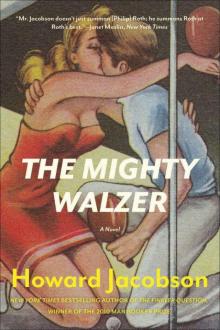 The Mighty Walzer
The Mighty Walzer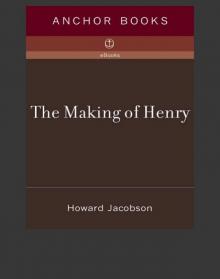 The Making of Henry
The Making of Henry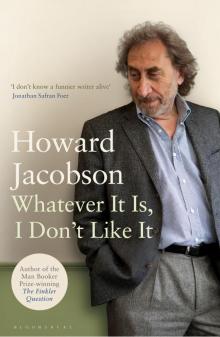 Whatever it is, I Don't Like it
Whatever it is, I Don't Like it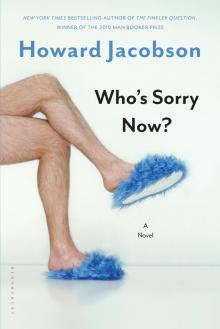 Who's Sorry Now?
Who's Sorry Now? Kalooki Nights
Kalooki Nights